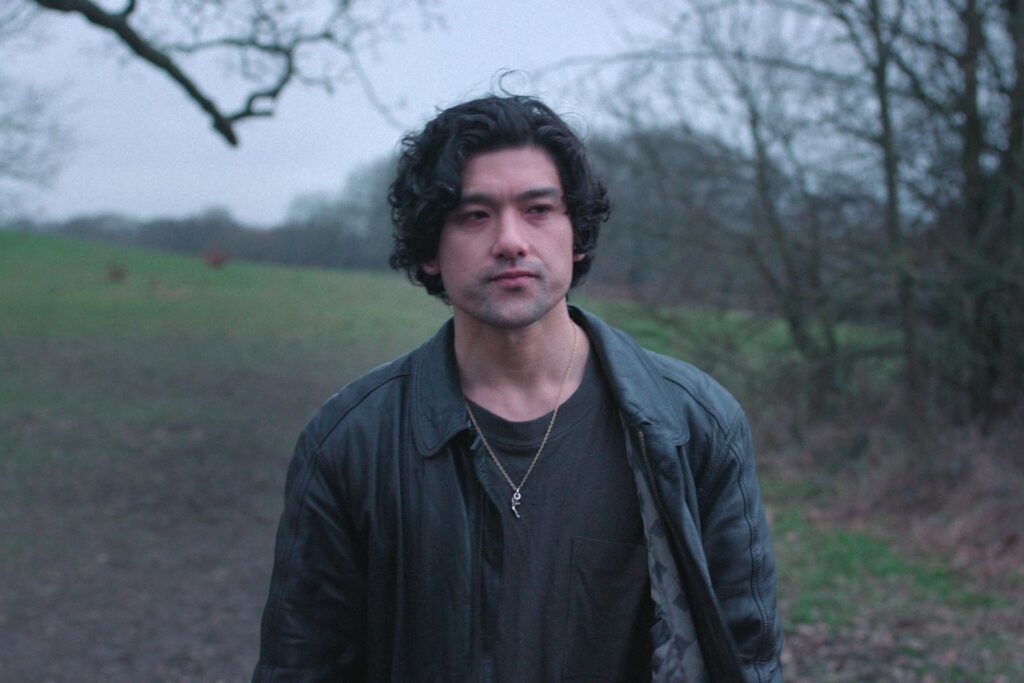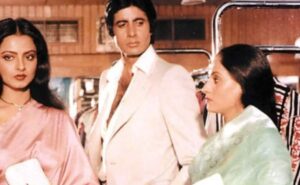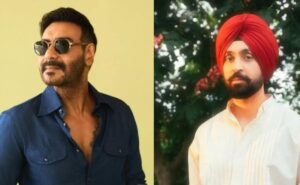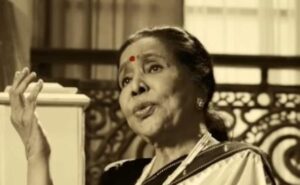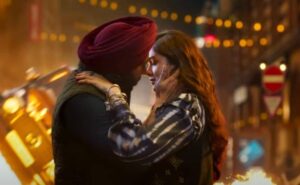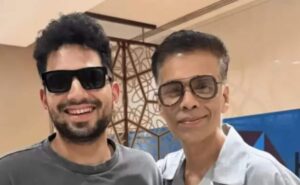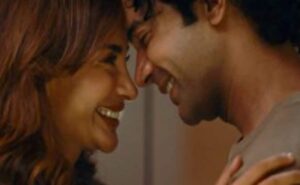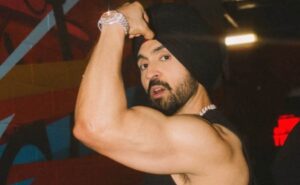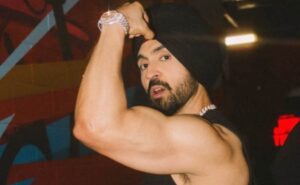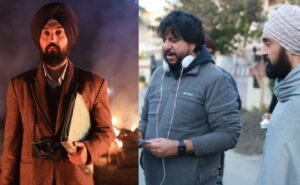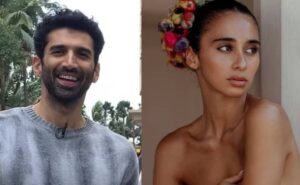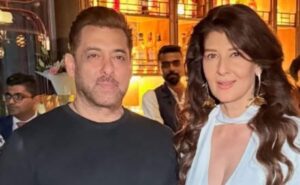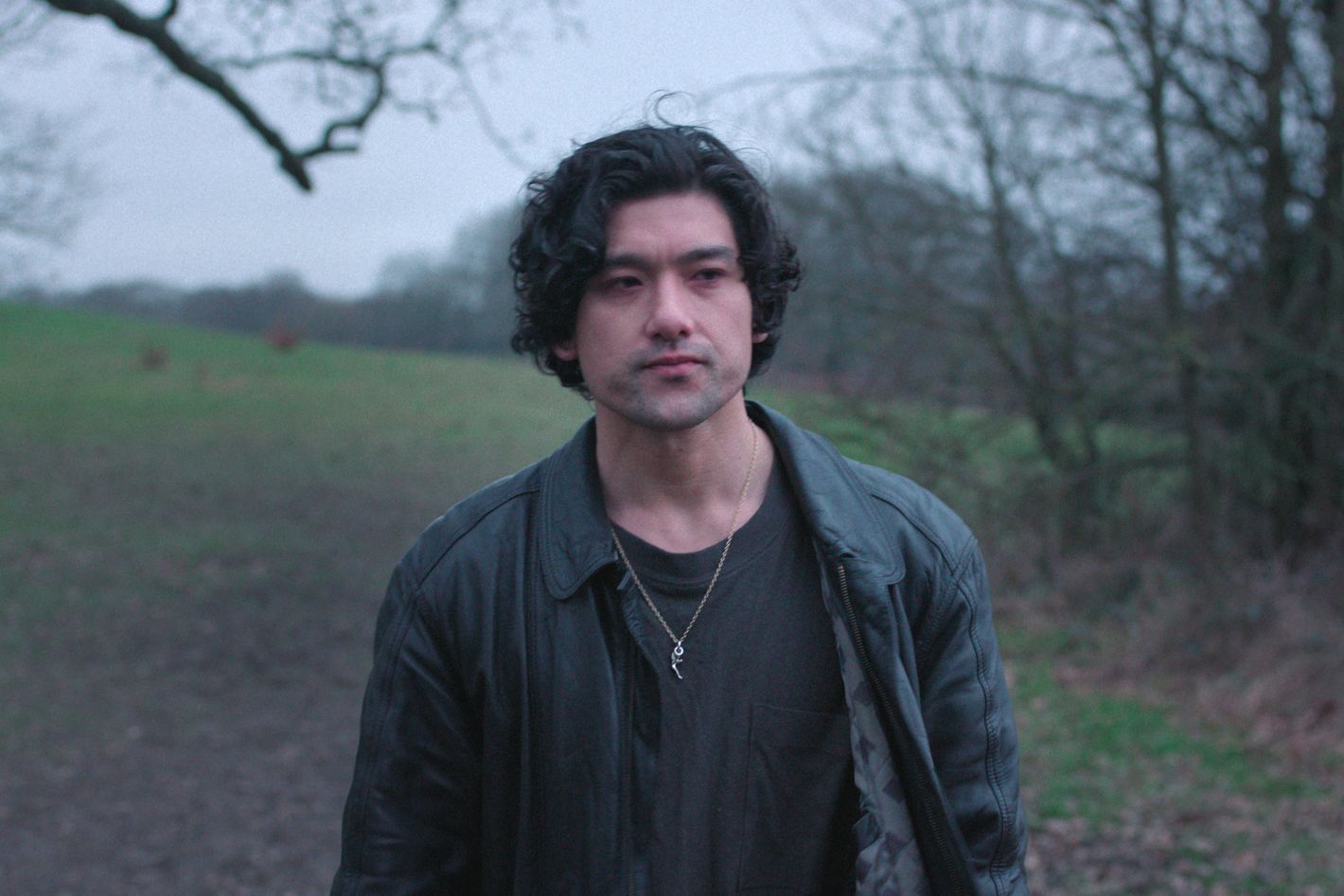
“My Mr. Darcy. My Rochester. My … Felix.” This line of voice-over concludes the first episode of Too Much, and it gives this Felix character some tough acts to follow as a leading man in an English romance. The new series from Lena Dunham frequently hearkens back to Jane Austen, as well as canonized London-set rom-coms of the ’90s and 2000s like Bridget Jones’s Diary and the work of Richard Curtis. These stories only work if their compelling heroines fall for characters who are interesting in their own rights and worthy of the leading lady’s affections. Thankfully for viewers, Will Sharpe is up to the task.
Sharpe, who played Ethan on The White Lotus season two and more recently the tour guide James in Jesse Eisenberg’s A Real Pain, now gets to be a Netflix leading man opposite Megan Stalter in a role that isn’t a direct one-to-one for Dunham’s own love story with her husband Luis Felber, but is not not inspired by it. Sharpe bonded with the character, Felix, in Dunham’s scripts and worked with Felber to write his character’s songs on the show. He plays the aspiring musician as deeply sensitive with a dry sense of humor, a man who’s to overcome his demons while falling in love with Jess (Stalter). In an interview about the finale and what’s next for this show, Sharpe gushes about Stalter, Dunham, and the other most important woman he collaborated with on the show: Mia the dog.
How did you get involved with Too Much?
I went for coffee with Lena, and I think at that point I hadn’t read any scripts yet. She talked me through the idea for the show, where it came from, the character of Felix, and what his story might be. I was excited to meet with her because I was a big fan. I saw Tiny Furniture at a time when I was making micro-budget movies in the U.K. I remember thinking, That’s kind of a kindred spirit over there. There’s something so specific and empathetic, but also really witty and funny, about the way she writes.
Even at that early stage, she’d mapped out a journey for Felix. She was explaining how she’d written the character as mixed-race. Lu [Luis Felber], her husband, is half Peruvian. We talked a bit about my heritage, being half Japanese, half British, and noticing little things in common. Like the character plays five-a-side football at one point, and I was like, “I do that on Mondays!” Then I read the scripts, and I thought they were so funny and so tender and felt like there was plenty to use to find a way into Felix. Right from the beginning, Lena was so collaborative and open and curious about everyone’s thoughts.
What specifically stood out to you about how Felix was written when you read the script?
I liked that Felix was messy and imperfect and had baggage. When you meet him, he’s gotten clean, he’s writing his own music, and he’s trying to be a better person, but I love that it’s not that easy for him. He can’t just glide into this relationship without any hurdles, and some of those hurdles are basically that he’s in his own way.
She’d written scenes and episodes from his perspective, and I always think that’s so helpful for the audience. I just love that he’s carrying a bit of darkness, but he’s often light with it, and he’s kind of cool, but not really. The thing about musicians is that they are genuinely cool, but they’re also complete dorks. Quite quickly, you get a sense that his defenses are up, and as the series goes on, you understand why that is. By the end of the shoot, I felt quite protective of him, and of Jess, and their vulnerabilities. Also, the show was imbued with this real love story, and that must have had an impact on the feeling of making it.
What from your own background did you bring to the character?
Lena wanted to make it feel authentic, and the first time we met, we noticed similarities. Lu moved to England at exactly the same age I moved to England from Japan. That comes into my own writing a lot — the feeling of trying to figure out where your home is. Felix’s surname is Remmen, and I remember saying to her, “There’s absolutely no way that if his surname was Remmen, he would not have been called ‘Felix Ramen’ at school.” Lena took that and wrote it into the wedding. There was a line like, “The groom is the one person who doesn’t call me ‘Felix Ramen.’” Then I remember asking Janicza Bravo and David Jonsson, “Do you think it would be too much if you also call me ‘Felix Ramen,’ even though I just told Jess you never have?” We laughed, but it’s in the show.
What was your experience playing the music for this?
As a teenager, I was in bands — the first one ever was called Phosphine. I remember my friends just absolutely ripping the piss out of me for that. And when I first moved to London, I’d sometimes do open-mic nights, so I wasn’t starting from nothing. I really liked Lu’s music, and we worked together very closely on the songs, and a lot of it we did play live in the show, which hopefully gives it a slightly tactile feeling and isn’t too polished and bogus. But to do that, I’d be like, “Can I just slightly simplify the guitar part so I could sing it confidently at the same time?”
I pitched to play the final song on the piano because I’m stronger on the piano, and I felt like it would give it a different feeling. I changed the key of it to try to move my voice into a slightly less comfortable place, because I felt like it would make him seem more vulnerable. And then when we were doing a prerecord for the heavy-metal flashback, I was doing some screaming and completely fucked my voice. If you listen carefully, you can hear toward the end of episode two, when I come in with the mixtape, my voice is really weird. Prasanna Puwanarajah learned to play the drums in about 48 hours, and Carlos from Fontaines D.C. is in the band, and also Dave Ashby from a band called Sleaze. We had actual band rehearsals.
How do you feel about the nostalgic rom-coms that the show is riffing on?
Lena’s aware and fond of all of those romantic-comedy tropes, but the show is Lena’s version of that, so it’s got a bit more battery acid in there. But to play Felix properly, I felt like he couldn’t have any awareness that he’s in a romantic comedy.
Can you tell me about working and developing onscreen chemistry with Meg?
I thought she was so brilliant in Hacks. She was my favorite character. I first met Meg in rehearsals at Working Title. We chatted for a while with Lena and then talked through the show, ran some scenes, but in quite a gentle way. We didn’t go in too hard too early, so we didn’t overcook it in rehearsal. So in those early scenes where the characters are getting to know each other, it’s not like we’d done that scene 25 times already, and I know everything about Meg, and there’s no mystery. A lot of it came from Lena and the way she ran the set, and how generous she is and how safe she made us feel.
What was the episode-seven shoot like, with Kaori Momoi and Stephen Fry as your parents?
It was a really rewarding day. I’ve hugely looked up to Stephen Fry from when I first started doing comedy, so to meet him and to work with him was amazing. And my mum was so excited about Kaori. She was the real deal — so charismatic, but in such a specific way.
How about filming episode four with Richard E. Grant and Naomi Watts?
I learned from fighting with him that Richard Grant is very strong. We were trying to make it as sloppy as possible. Naomi also was brilliant.
Tell me about filming the explosive fight with Jess in the finale.
Meg and I would always be chatting in the makeup trailer and joking around, but Lena decided to keep us separate for the whole morning before we shot that scene. Lena wanted to make sure there was a tension heading into it. It was actually really effective in focusing us on the task at hand, reminding us to take it seriously. She shot it with two cameras so that we could talk over each other. The script was there, but she really encouraged us to build on it. I remember her saying, “It doesn’t need to feel like the characters are ever going to come back from this. I want you to make it feel like the end.” We’d do a take, and it’d be like, “Okay, it’s close. Maybe let’s go in harder.”
Then, when I started hitting myself in the face, I had a bruise for a while, which they had to cover up in makeup. But that was one of the most cathartic scenes to film, weirdly, because I suppose there’s a lot that is unsaid between them. And it’s quite scary to say stuff that isn’t even scripted. Lena would be like, “Let’s do it again,” and it would go as far as you want. I think at one point, Astrid was going to die at home, and I was like, “Can Felix try and fail to save her so that he still feels like he’s fucked up, but at least he tried?” I love that episode, and Meg was so brilliant in that scene when we’re fighting each other and bringing it.
Was you hitting yourself in the script?
No. I didn’t know I was going to do it until I did it. I knew the feeling that Lena wanted for the scene, and I felt like there was probably more to mine from his frustration that he can’t express himself the way he feels he needs to — the feeling of, Here we go again.
Can you tell me about filming with Astrid?
So Mia, who plays Astrid, has had an agent for over ten years. This is her first gig. She’s now 11. She was nervous sometimes but got used to it and loved being snuggled up in a blanket. One time, she did shit on the bed while I was in it, but that was okay. She’s a dog. As working with animals goes, she was pretty pro.
What was it like to film that very sad scene at the animal hospital opposite a fake dead dog?
It’s like when you’re working with a green screen or something, where you just have to really believe it. It was obviously so serious all day, and I was so in it and genuinely sad about the story, but there was one take where the kind of rigidity of that thing did make me laugh.
How about filming the reconciliation scene at the climate protest?
It was rainy and cold, but it had a very British version of a romantic atmosphere. It didn’t feel overstated or super staged. It just felt like the scene feels, I suppose — kind of fun, and a bit of a release. And with the glue, we just pretended. We just put our hands on the ground, no actual glue. I’m only saying that because a different interviewer asked me how we did it, and I was like, “We just put our hands down on the ground?”
And the final scene?
I felt like a dork in a fun way in the fantasy costume. It’s slightly tongue-in-cheek; it felt sweet and appropriate. At the end, he says that last line, “How long should we stay married?” or something. I remember Lena being like, “We need to somehow just undercut the ‘happily ever after,’ because obviously who knows how it’s going to go. So let’s enjoy the moment, but with a little wink.”
Have there been discussions about where these characters go from here and if there is going to be a second season?
I think Lena’s been thinking about it, but I haven’t spoken to her about it. But I know that there’s an intention; there are ideas floating about.
You’ve been prominent as a writer and an actor in the U.K. for years. You’ve run your own series and won a BAFTA for acting, but The White Lotus brought you to a new audience and put you at a new level of American celebrity. What are your thoughts about that shift and that moment in time when you did White Lotus?
It is probably still, to date, the thing that’s been watched the most that I’ve been in, and I definitely think that opportunities have come my way that probably wouldn’t have if I hadn’t been in it. I suppose what’s so impressive about that show, and what Mike White does with it, is that it still feels very much authentic to him and his voice, and it still feels elevated and kind of sophisticated, but it’s also very populist. I remember him once saying, “The one thing I’d never want the show to be is boring.” It’s a weird privilege as a director to be on other people’s sets and to learn about how they do it. In a week’s time, I’m going to start shooting my own series for Apple, and I definitely feel like I’m carrying stuff from Lena, stuff from Jesse Eisenberg, stuff from Mike White, stuff from everyone that I’ve been around.
What’s this Apple show you’re doing next?
It’s called Prodigies, and it’s about two child prodigies who are now in their early 30s and living very unremarkable lives. They met as kids and became boyfriend-girlfriend in a cute way, but then they stayed together into their adult life. It’s like a love story, but about long-term relationships. It also deals with this idea of potential and that feeling of, Is this who I’m supposed to be? Are you supposed to fulfill your potential? Am I who everyone else thought I was going to be? Should I be trying harder, or should I be happy with what I have? That’s with Ayo Edebiri. I’ve written it, I’m going to be in it, and I’m directing it, which I haven’t done for ages, but I’m excited about being back on the other side of the camera. I haven’t done that since Landscapers.
What will it be like to direct yourself again, after this moment of White Lotus and A Real Pain and Too Much?
I didn’t go to film school or anything. I was just trying to make short films, sketches, even feature films with friends. I’ve done short films where I’m holding my own reflector out of shot. At its best, whatever the scale of the production, if there’s a good vibe, it feels like, Here we are, a bunch of like-minded people trying to tell a story.
It was announced that you were going to be directing the film adaptation of Crying in H Mart, and that’s no longer happening. Can you share what happened with that?
I’m so sad about it. There was quite a specific window in which we needed to make it; then, for a variety of reasons, not least the strikes, it became impossible. I am not sure exactly where it’s at at the moment, but I did love that project, and I love the book, and I hope it gets made.
Related
“I had a bruise for a while, which they had to cover up in makeup.”

